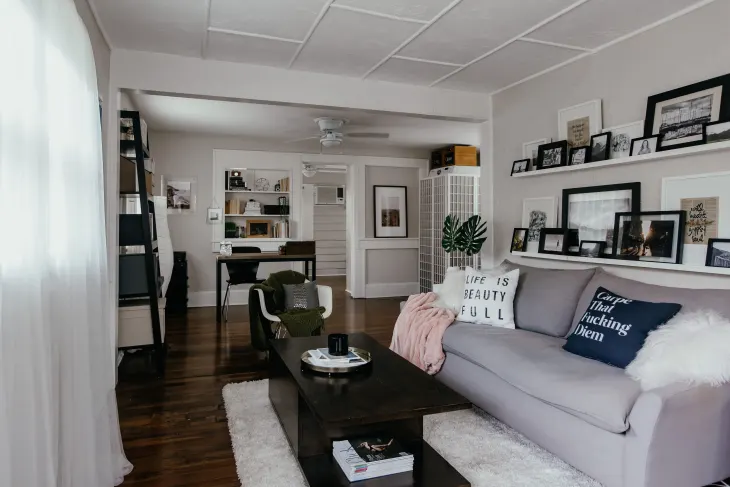It’s no secret that buying a home can be a daunting task, especially for first-time homebuyers. You want to make sure you don’t overpay, but it can be hard to know where to even start. That’s why we’ve put together this list of 10 essential tips for first-time homebuyers so that you can confidently navigate the housing market and secure your dream home without spending too much money. From understanding mortgage terms and rates, to researching seller incentives and negotiating with confidence, read on to learn everything you need to know about buying your first home — without breaking the bank.
Get a real estate agent
When you’re ready to start looking for a home, it’s time to find a real estate agent. A good real estate agent will be familiar with the area you’re interested in and will be able to help you find the right home at the right price. They’ll also be able to negotiate on your behalf and help you through the process of buying a home.
If you’re not sure where to start, ask your friends or family if they have any recommendations. Once you’ve found a few agents, interview them to see if they’re a good fit for you. Ask about their experience, what kind of homes they specialize in, and what their process is like. You should also make sure that they’re someone you feel comfortable working with.
Once you’ve found the right agent, they’ll help you find homes that match your criteria and budget. They’ll also be there to answer any questions you have and help you through the process of buying a home.
Get a loan pre-approval
If you’re a first-time homebuyer, the thought of purchasing a home may be both exciting and daunting. The process of finding and financing a home can be complicated, but there are some simple steps you can take to make sure you don’t overpay.
One of the most important things you can do is get a loan pre-approval from a lender. This will give you an idea of how much money you’ll be able to borrow, and it will also help to keep you from getting in over your head financially.
When you’re looking at homes, it’s easy to get caught up in the excitement and start envisioning yourself living there. But it’s important to remember that a home is just a physical structure – it’s not an investment. You shouldn’t be looking at homes that are out of your price range just because you think they’ll appreciate in value or because you think you’ll be able to sell them for more later on.
It’s also important to be aware of the potential hidden costs of owning a home. Things like property taxes, insurance, and repairs can add up quickly, so make sure you factor those into your budget when you’re considering how much house you can afford.
If you take the time to do your research and stay within your budget, buying a home can be a great experience. Just make sure you don’t let yourself get caught up in the hype and end up paying too much for your new
Know your credit score
Your credit score is one of the most important factors in determining whether or not you qualify for a mortgage, and what interest rate you’ll pay. Most people have a FICO score between 620 and 850. A higher score means you’re less of a risk to lenders, and will probably get a lower interest rate. You can check your credit score for free with Credit Sesame or Credit Karma.
If your credit score is on the lower end, there are still options for you to get a mortgage, but you may have to put down a larger down payment, or get an adjustable-rate mortgage (ARM). An ARM has a lower interest rate for a set period of time, usually 5 years, after which it goes up based on market conditions. This can be risky if rates go up significantly, so make sure you understand how it works before signing up for one.
Research the neighborhood
When you’re buying a home, it’s important to research the neighborhood before making an offer. You’ll want to consider things like the crime rate, the quality of schools, and the overall feel of the neighborhood.
If you’re not familiar with the area, talk to a real estate agent or someone who lives there. They’ll be able to give you a good idea of what it’s like to live in the neighborhood. Once you’ve done your research, you’ll be able to make an informed decision about whether or not it’s the right place for you.
Understand the market
As a first-time homebuyer, you may not be aware of all the factors that go into pricing a home. It’s important to understand the market and be aware of what similar homes in the area are selling for so you don’t overpay.
The first step is to research the prices of comparable homes in the area. Look at listings online and in your local paper to get an idea of what similar homes are selling for. You can also talk to a real estate agent to get more insight into the local market.
Once you have an idea of what homes are selling for, you can start to negotiate with the seller. If you feel like the asking price is too high, make an offer that is lower than the asking price but still within your budget. The seller may counteroffer, but you can continue negotiating until you reach a fair price for both parties.
Make a strong offer
If you’re a first-time homebuyer, it’s easy to get caught up in the excitement of finally finding your dream home and overlooking important financial details. But if you want to avoid overpaying for your home, it’s important to remember a few key things when making an offer.
First, be realistic about what you can afford. It’s easy to get emotionally attached to a property and convinced that you’ll find a way to make the monthly payments work, but it’s important to stay within your budget. Use a mortgage calculator to estimate what your monthly payments would be and only offer what you’re truly comfortable with.
Next, be aware of the market value of the property you’re interested in. Research recent sales of similar homes in the area and have a clear idea of what the fair market value is before making an offer. Don’t be afraid to lowball your initial offer – the seller may counter with a higher price that’s still below their asking price, which is where you want to be.
Finally, don’t forget about closing costs and other fees associated with buying a home. These can add up quickly, so make sure your offer includes enough wiggle room to cover these additional costs. With these tips in mind, you can make a strong offer on your dream home without overpaying.
Have a home inspection
A lot of first-time homebuyers skimp on getting a professional home inspection, thinking they can save a few hundred dollars. But this is a mistake! A good home inspector will not only identify any potential problems with the property, but also give you an estimate of how much it would cost to fix them. This information is critical in helping you determine whether or not you can afford the property.
Be prepared for repairs
When it comes to home repairs, being prepared can save you a lot of money. First-time homebuyers often forget to factor in the cost of repairs when budgeting for their new home. This can lead to financial difficulties down the road if unexpected repairs come up.
To avoid this, be sure to set aside some money each month to cover the cost of any potential repairs. Additionally, familiarize yourself with the most common types of repairs that homeowners face so that you can be prepared mentally and financially if they arise.
Have realistic expectations
As a first time homebuyer, it is easy to get caught up in the excitement of finally owning your own home. However, it is important to keep in mind that a home is a long-term investment, and you should not expect to see immediate financial gain from your purchase. The value of your home will likely appreciate over time, but it is important to have realistic expectations about how much it will increase in value and how quickly that appreciation will occur.
It is also important to be aware of the potential risks involved in any real estate transaction. There is always the possibility that the property you purchase will decrease in value, or that you may encounter problems with the title or other aspects of the transaction. While these risks can be mitigated by working with experienced professionals, it is important to be aware of them before making any decisions.
Have patience
It takes time to find the right home. Don’t be in a hurry to make an offer on the first home you see. It’s important to shop around and compare prices before making an offer.
Take your time when looking for a home. There is no need to rush into things. Take your time and find the right home for you and your family. Make sure you don’t overpay for your new home by shopping around and comparing prices.











